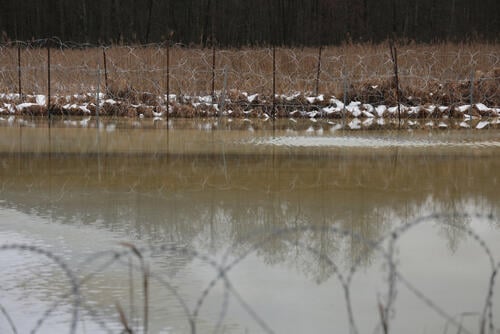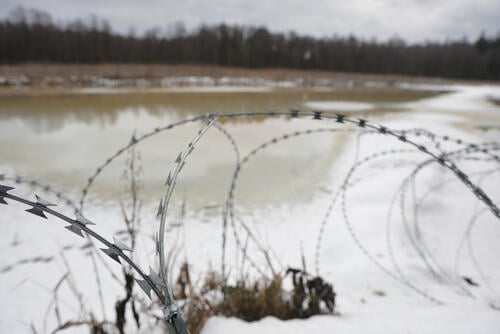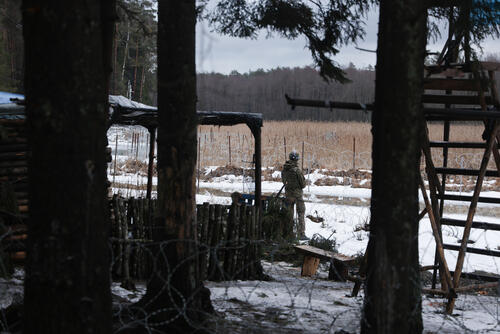- We are deeply concerned by the Polish government's plan to suspend the right for people to seek asylum in Poland.
- This is a major escalation in a series of actions to dehumanise migrants, refugees, and asylum seekers.
- MSF urges the Polish government to change their course of action and ensure migrants and refugees are protected in the country.
Warsaw- Médecins Sans Frontières (MSF) is deeply concerned by the Polish government’s plan to suspend the right for people to seek asylum in Poland. Such a suspension will have predictable dramatic consequences for people seeking safety in Europe. MSF calls on the Polish authorities to drastically change course of action and take all necessary measures to ensure the protection and rights of refugees and migrants.
Over the last days, the Polish government announced a strategy to reform the country’s migration policy, including the possibility of a temporary suspension of the right to seek asylum in Poland in order to “regain control” of borders and “ensure security”.https://notesfrompoland.com/2024/10/15/polish-government-approves-tough-new-migration-strategy-including-possibility-to-suspend-asylum/
While the full details of the government’s plan are yet to be disclosed, MSF warns that such restrictive and punitive measures against people seeking safety, denying them legal pathways to protection, would only lead to more harmful border practices at the Poland-Belarus border and further expose already vulnerable people to life-threatening conditions.
“The Polish government’s willingness to further restrict and suspend the right to seek asylum is extremely concerning and risks leading to more unchecked pushbacks and violence against people crossing the border,” says Uriel Mazzoli, MSF Head of Mission in Poland.
The new Polish government had an opportunity to reform the country’s asylum and reception system but has instead only deepened existing and dangerous political rhetoric.Uriel Mazzoli, MSF Head of Mission in Poland
“The new Polish government had an opportunity to reform the country’s asylum and reception system but has instead only deepened existing and dangerous political rhetoric, rooted in a ‘crisis’ narrative, further normalizing a militarized response, violent practices and denial of humanity to people seeking safety in the European Union,” says Mazzoli.
Since November 2022, MSF teams have treated over 400 people, many of them stranded for weeks in uninhabitable forests and exposed to violent practices at the border. Given the extreme conditions of deprivation people experience in the border area, MSF patients suffer from a wide range of severe medical conditions ranging from exhaustion, hypothermia, dehydration, trench foot to mental health issues.
In 2024, our teams have also witnessed a sharp increase in people carrying the scars of physical assaults, including bruises and dog bites. In July 2024, MSF teams treated for the first time injuries related to the use of rubber bullets being fired. Additionally, half of people MSF has seen in 2024 have reported having been pushed back, some of them several times.
This latest announcement represents a further escalation of an already extremely hostile environment for people on the move and those providing humanitarian assistance to them. In June 2024, the Polish authorities imposed a ban on access to the border zone, which has prevented civil society and humanitarian organizations from accessing people in need in these areas.

Despite official requests for unrestricted and independent access to the entire border region, MSF has been granted access to only a limited part of the buffer zone. This buffer is an exclusion zone along 60 kilometers of the country’s border with Belarus and includes key locations where most people on the move have been crossing the border since 2021.
Not only does this ban prevent the delivery of essential assistance, but it also enables much of the violence reported by people we treat to take place out of sight.
“The restrictions on humanitarian and medical aid at the Poland-Belarus border are already alarming, with entire zones where humanitarian workers are prevented access and a legislation that could favor the use of violence by state authorities,” says Mazzoli. “Delaying assistance and medical care to people at the border can have life-threatening consequences as many of the patients we see experience health issues that can rapidly deteriorate.”
The suspension of territorial asylum will have far-reaching consequences on the capacity of people seeking safety in Poland to access medical care and protection. Worryingly so, such extraordinary measures are becoming the despicable new normal in the European Union (EU), where governments and institutions have increasingly seized upon the notion of ‘crisis’ as a reason to derogate from minimum standards and people’s rights.
Over recent years, MSF teams have witnessed many examples of the detrimental consequences of policies that put border controls above human life across our projects in Greece, Libya, the Central Mediterranean Sea and Belgium. For too long now, EU member states have been waging a war on some of the world's most vulnerable people under the guise of 'instrumentalisation' by third countries.
MSF calls on the Polish authorities to retract the announced suspension of the right to seek asylum and to end this gross dehumanisation of refugees and migrants and the increasing militarisation of responses towards them.
MSF activities in Poland:
After a short intervention along the Poland–Belarus border region in 2021, MSF teams returned in the Podlasie region, near the border with Belarus, in November 2022. Since then, our medical team provides basic medical care through mobile teams in remote locations and organise emergency referrals and follow-up, in close cooperation with other organisations and civil society groups. Furthermore, since 2022, MSF supports the Polish Ministry of Health to offer medical and psychosocial care to patients with tuberculosis.





